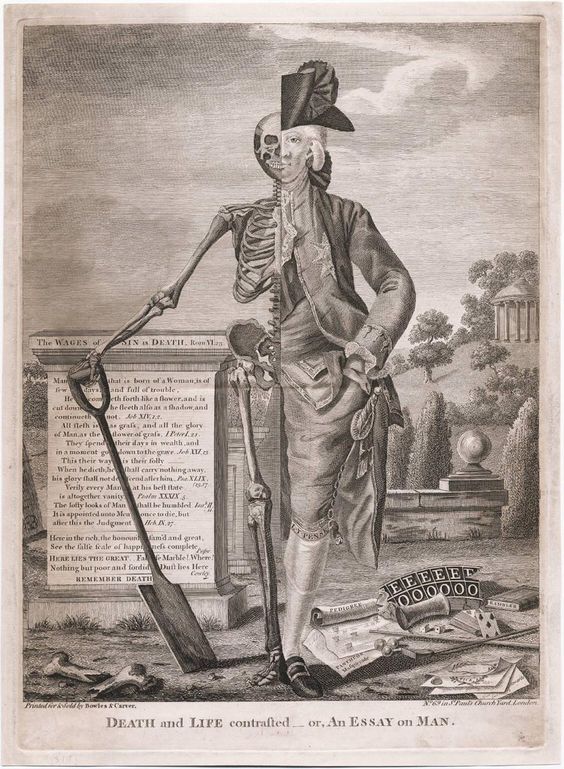Medicine and the Body in the Age of Enlightenment (Kathryn Woods)
The body is at once the ‘object’ of medical knowledge and the ‘subject’ of medical practice, as well as the embodied medium through which we experience health, disease and medicine. But what is the body? Has the body always meant the same thing to different people, in different places at different times? Did the advent of 'modern' medicine alter understandings of the body? In this seminar we will explore a multitude of different ways that the body has been theoretically conceptualised in philosophical, medical, sociological, anthropological and historical thought since the 'Age of Enlightenment'. We will also critically evaluate various methods that have been used to examine the body in more recent histories of medicine. Specifically, we will investigate how the Enlightenment led to the creation of new forms of knowledge about how the body worked and the ways this altered how people understood and experienced their own bodies and perceived those of others. Part of this will involve an examination of how the Enlightenment contributed to the ‘professionalisation’ and ‘popularisation’ of medical knowledge.
Seminar/Essay Questions
- What is the body and does it have a history?
- Does the biomedical body constrain the social body or visa versa?
- How did the eighteenth-century body 'embody' the enlightenment?
- In what ways did the body become less ‘fluid’ in the eighteenth century?
- What was more important to the creation of new medical ideas about the body: ‘professionalisation’ or ‘popularisation’?
- Was the 'modern' body made in the eighteenth century?
Core Readings:
- Mariam Fraser and Monica Greco, The Body: A Reader (London & New York: Routledge, 2005). Please read the introduction and a selection of at least 3 of the following extracts: (multiple copies in library)
- Elizabeth Grosz, ‘Refiguring Bodies’, pp. 47-51.
- Maurice Merleau-Ponty, ‘The Experience of the Body and Classical Psychology’, pp. 52-4.
- Gilles Deleuze, ‘Spinoza and Us’, pp. 58-61.
- Judith Butler, ‘Bodies that Matter’, pp. 62-5.
- Marcel Mauss, ‘Techniques of the Body’, pp. 73-7.
- Mary Douglas, ‘The Two Bodies’, p. 78-81.
- Erving Goffman, ‘Embodied Information in Face-to-Face Interaction’, pp. 82-6.
- Norbert Elias, ‘Civilization and Psychosomatics’, pp. 96-9.
- Michel Foucault, ‘The Political Investment of the Body’, pp.100-104.
- Thomas Laqueur, ‘Orgasm, Generation, and the Politics of Reproductive Technology’, pp.151-7.
- Barbara Duden, The Woman Beneath the Skin: A Doctor’s Patients in Eighteenth-Century Germany (London: Harvard University Press, 1991). multiple copies in library
- Roy Porter, Bodies Politic: Disease, Death and the Doctors in Britain, 1650-1900 (London: Reaktion, 2001). Particularly chapters 2, 3, 5 and 6.
Further readings:
Claudia Benthien, Skin: On the Cultural Border between the Self and the World (New York: Columbia University Press, 2002).
Caroline Bynum, ‘Why all the Fuss about the Body? A Medievalist’s Perspective’, Critical Inquiry, 22 (1995), p. 1-31. e-journal
Michel Feher (ed.), Fragments for a History of the Human Body (New York: Zone, 1989).
Mary Fissell, Vernacular Bodies: The Politics of Reproduction in Early Modern England (Oxford: Oxford University Press, 2004).
Anthony Fletcher, Gender, Sex and Subordination in England 1500-1800 (New Haven & London: Yale University Press, 1995). e-book
Christopher Forth & Ivan Crozier (eds), Body Parts: Critical Explorations in Corporeality (Oxford: Lexington Books, 2005).
Laura Gowing, Common Bodies: Women, Touch, and Power in Seventeenth-Century England (New Haven & London: Yale University Press, 2003).
multiple copies in library
Helen King, The Disease of Virgins: Green Sickness, Chlorosis and the Problems of Puberty (London: Routledge, 2004).
Thomas Laqueur, Making Sex: Sex and Gender from the Greeks to Freud (Cambridge: Cambridge MA, 1989). multiple copies in library
Roy Porter (ed.), Patients and Practioners: Lay Perceptions of Medicine in Pre-Industrial Society (Cambridge: Cambridge University Press, 1985). e-book
Roy Porter, Flesh in the Age of Reason (London: Penguin, 2004).
Carole Reeves (ed.), A Cultural History of the Body: The Enlightenment (Oxford: Berg, 2010).
Jonathan Reinarz and Kevin Siena (eds), A Medical History of the Skin: Scratching the Surface (London: Pickering and Chatto, 2013). e-book
Londa Schiebinger, The Mind has No Sex? Women in the Origins of Modern Science (Harvard: Harvard University Press, 1991). multiple copies in library
David Turner, Disability in Eighteenth-Century England (New York: Routledge, 2012). e-book
